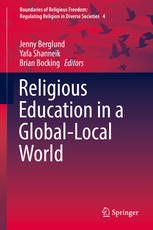

Most ebook files are in PDF format, so you can easily read them using various software such as Foxit Reader or directly on the Google Chrome browser.
Some ebook files are released by publishers in other formats such as .awz, .mobi, .epub, .fb2, etc. You may need to install specific software to read these formats on mobile/PC, such as Calibre.
Please read the tutorial at this link: https://ebookbell.com/faq
We offer FREE conversion to the popular formats you request; however, this may take some time. Therefore, right after payment, please email us, and we will try to provide the service as quickly as possible.
For some exceptional file formats or broken links (if any), please refrain from opening any disputes. Instead, email us first, and we will try to assist within a maximum of 6 hours.
EbookBell Team

0.0
0 reviewsThis book examines Religious Education (RE) in over ten countries, including Australia, Indonesia, Mali, Russia, UK, Ireland, USA, and Canada. Investigating RE from a global and multi-interdisciplinary perspective, it presents research on the diverse past, present, and possible future forms of RE. In doing so, it enhances public and professional understanding of the complex issues and debates surrounding RE in the wider world. The volume emphasizes a student-centred approach, viewing any kind of ‘RE’, or its absence, as a formative lived experience for pupils. It stresses a bottom-up, sociological and ethnographic/anthropological research-based approach to the study of RE, rather than the ‘top down’ approaches which often start from prescriptive legal, ideological or religious standpoints. The twelve chapters in this volume regard RE as an entity that has multiple and contested meanings and interpretations that are constantly negotiated. For some, ‘RE’ means religious nurturing, either tailored to parental views or meant to inculcate a uniform religiosity. For others, RE means learning about the many religious and non-religious world-views and secular ethics that exist, not promoting one religion or another. Some seek to avoid the ambiguous term ‘religious education’, replacing it with terms such as ‘education about religions and beliefs’ or ‘the religious dimension of intercultural education’.